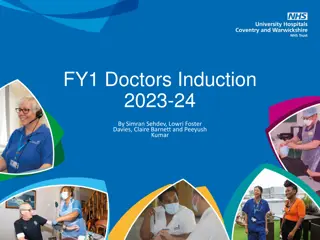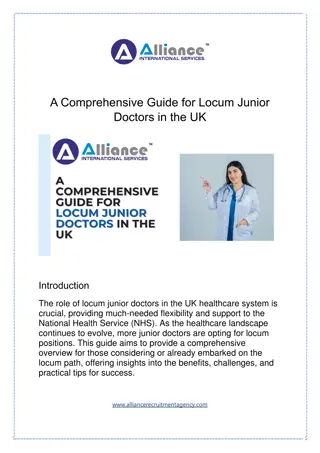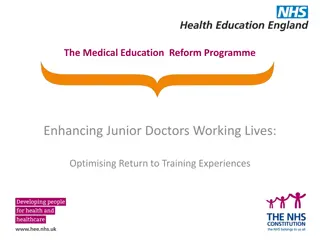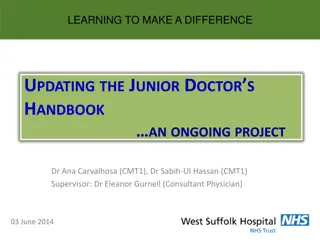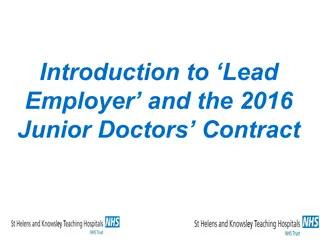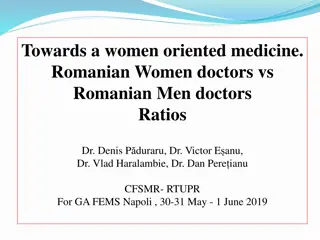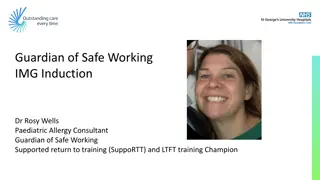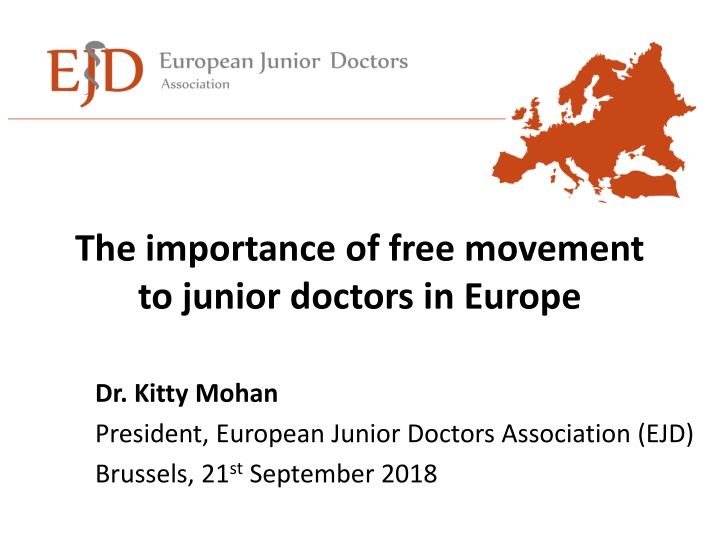
Importance of Free Movement for European Junior Doctors
Exploring the significance of free movement for junior doctors in Europe, the European Junior Doctors Association (EJD) aims to represent and promote their interests, enhance healthcare standards, and facilitate exchange of information. The ability to move freely is facilitated by directives like the Recognition of Professional Qualifications Directive, impacting doctors, patients, hospitals, governments, and decision-makers. Reasons for doctors moving vary, including academic, financial, research, and personal factors, highlighting the importance of understanding both why doctors move and why they stay in their countries.
Uploaded on | 0 Views
Download Presentation

Please find below an Image/Link to download the presentation.
The content on the website is provided AS IS for your information and personal use only. It may not be sold, licensed, or shared on other websites without obtaining consent from the author. If you encounter any issues during the download, it is possible that the publisher has removed the file from their server.
You are allowed to download the files provided on this website for personal or commercial use, subject to the condition that they are used lawfully. All files are the property of their respective owners.
The content on the website is provided AS IS for your information and personal use only. It may not be sold, licensed, or shared on other websites without obtaining consent from the author.
E N D
Presentation Transcript
The importance of free movement to junior doctors in Europe Dr. Kitty Mohan President, European Junior Doctors Association (EJD) Brussels, 21stSeptember 2018
European Junior Doctors Represents 300,000 junior doctors around Europe Founded in 1976 21 Full members, 1 Associate member Non-governmental (NGO), independent and non-profit organisation registered under Belgian law Registered office in Brussels
Member Countries Austria Croatia Czech Republic Estonia Finland France Germany Greece Hungary Ireland Italy Latvia Lithuania Malta Netherlands Norway Portugal Slovenia Spain Sweden Turkey United Kingdom
EJD Aims and Objectives Represent and promote the interests of Junior Doctors in Europe Exchange information and develop a common approach, and formulate common views on relevant topics e.g. the European medical workforce, postgraduate medical training and working conditions Improve and develop relations between Junior Doctors in European countries Protect and improve standards of healthcare in Europe 22.03.2025 4
Free movement of Doctors How is this currently possible? The Recognition of Professional Qualifications Directive (2005/36/EC) 22.03.2025 5
Free movement of Doctors How is this currently possible? The Recognition of Professional Qualifications Directive (2005/36/EC) Who is this important to? Doctors and their Patients Hospitals and health systems National Governments and workforce planners European-level decision makers 22.03.2025 6
Why do doctors move? Complex Multifactorial reasons likely including Academic opportunities Financial possibilities Research collaboration Likely to vary depending on where moving from in EU Personal connection/family links 22.03.2025 7
Why do doctors move? Complex Multifactorial reasons likely including Academic opportunities Financial possibilities Research collaboration Likely to vary depending on where moving from in EU Personal connection/family links BUT ALSO NEED TO CONSIDER WHY DOCTORS REMAIN IN THEIR COUNTRIES. 22.03.2025 8
EFPT survey Survey of 2281 members across 33 European countries. Key findings: Top host countries have higher incomes 2/3 of psychiatry trainees across Europe plan to migrate Higher migratory tendencies in south/east Europe as opposed to north/west Main reason for departure is academic/training opportunities Main reason for remaining is personal/family reasons Only 8.7% of those who left planned to return to their home countries 22.03.2025 10
Other issues Small EU countries In Malta, currently compulsory for Opthalmology trainees to spend time in UK during their residency in order to see range of cases or learn procedures/skills. 22.03.2025 11
Potential impact of Brexit Current medical workforce across Europe Non-UK medical graduates currently working in the UK Beyond 2019: Our future European medical workforce 22.03.2025 12
Potential impact of Brexit Current medical workforce across Europe Non-UK medical graduates currently working in the UK Beyond 2019: Our future European medical workforce 22.03.2025 13
2017 BMA survey In October 2017, the BMA conducted a nationwide survey of EEA doctors currently working in the UK. 1720 were responses received. Previous survey in 2017 found that 4 out of 10 EEA doctors working in the UK are planning to leave the country (BMA, 2017) but since this time increasing uncertainty expressed. This survey aimed to identify the scale of potential migration of EEA doctors to other countries, and the key factors affecting their intention to leave the UK. 22.03.2025 14
Key findings (1) Who are the doctors working in the UK? Stage of career currently Consultants (45.9%), General Practitioners (20.5%), Junior Doctors (18.1%) Length of time in the UK >20 years (25%); less than 5 years (25%) 22.03.2025 15
Key findings (2) Commitment to working in the UK 56.9% of EEA doctors said they are committed to working in the UK. However 44.7% of respondents are currently considering leaving the UK and moving to another country. <10% of respondents confident of a positive outcome in Brexit negotiations on EU and UK citizens rights. Most popular countries that the UK EEA doctors are considering moving to Germany (22%) , Spain (8.8%) but >15% considering to move outside EU. 22.03.2025 16
Case study An Italian qualified doctor, in residency programme in Germany working as Clinical Research Fellow at a British University but also working as as doctor in UK. 22.03.2025 17
Case study An Italian qualified doctor, in residency programme in Germany working as Clinical Research Fellow at a British University but also working as as doctor in UK. Benefit to patients in all of the countries in which you practise Experience in cutting edge research in public health and patient safety learnt in the UK, experience in 'customer-care' and patient-centred care learnt in Germany. 22.03.2025 18
Case study An Italian qualified doctor, in residency programme in Germany working as Clinical Research Fellow at a British University but also working as as doctor in UK. Benefit to patients in all of the countries in which you practise Experience in cutting edge research in public health and patient safety learnt in the UK, experience in 'customer-care' and patient-centred care learnt in Germany. Benefit to your colleagues in the wider health service, Working in different environments helps you getting on well with colleagues from a variety of backgrounds and to understand the way different health systems work. 22.03.2025 19
Case study An Italian qualified doctor, in residency programme in Germany working as Clinical Research Fellow at a British University but also working as as doctor in UK. Benefit to your personal development In the UK I have the chance to develop my expertise in Public Health Medicine (topic not much developed elsewhere), while in Germany I have the chance to improve my clinical skills (in a UK training programme it would last ages to learn the same things...). This combination is ideal to improve my career development both clinically and in research. 22.03.2025 20
Case study An Italian qualified doctor, in residency programme in Germany working as Clinical Research Fellow at a British University but also working as as doctor in UK. Benefit to your personal development In the UK I have the chance to develop my expertise in Public Health Medicine (topic not much developed elsewhere), while in Germany I have the chance to improve my clinical skills (in a UK training programme it would last ages to learn the same things...). This combination is ideal to improve my career development both clinically and in research. Benefit to your personal and family life Great chance to live a multicultural environment in 2 great EU countries. 22.03.2025 21
Croatian junior doctors Given a considerable brain drain of medical doctors from the Republic of Croatia, the Junior Doctors Committee of the Croatian Medical Chamber prepared a questionnaire on the satisfaction of junior doctors. The relevant questionnaire was available for filling in online in the period from February 1 to March 20, 2016. The questionnaire was completed by 1,531 people aged between 29 and 35 (mean age 32) of which 67% were females. Lijec Vjesn 2016;138:179 188 22.03.2025 22
Would doctors leave? Lijec Vjesn 2016;138:179 188 22.03.2025 23
Why would doctors leave? Lijec Vjesn 2016;138:179 188 22.03.2025 24
Why would doctors stay? Lijec Vjesn 2016;138:179 188 22.03.2025 25
Financial penalties Croatian law obliges doctors on completion of their residency to remain at the same hospital/institution for the same length of time as their residency programme. If doctors break this contract they are obliged to pay back the money invested during their training, which can range from 2000 to 70000 (average 30000 ). At the EJD General Assembly in October 2017, two other delegations present (Slovenia and Latvia) described mandatory service measures currently used in their countries. A further five EJD delegations described on-going threats that similar measures may be introduced in their countries. 22.03.2025 26
Conclusions Junior doctors are a heterogeneous group and reasons for leaving and remaining in own country are complex. Free movement of doctors across Europe essential for optimum training, research, and skill-sharing opportunities and to learn about different health systems. Answer does not lie in forcing doctors to remain in country or penalising them if they want to leave. Need investments in health systems and in postgraduate training to make junior doctors feel valued and allow doctors to make positive choices to remain in their own countries. 22.03.2025 27
Thank you for listening. Email: president@juniordoctors.eu Twitter: @ejdpwg / @DrKittyMohan 22.03.2025 28


